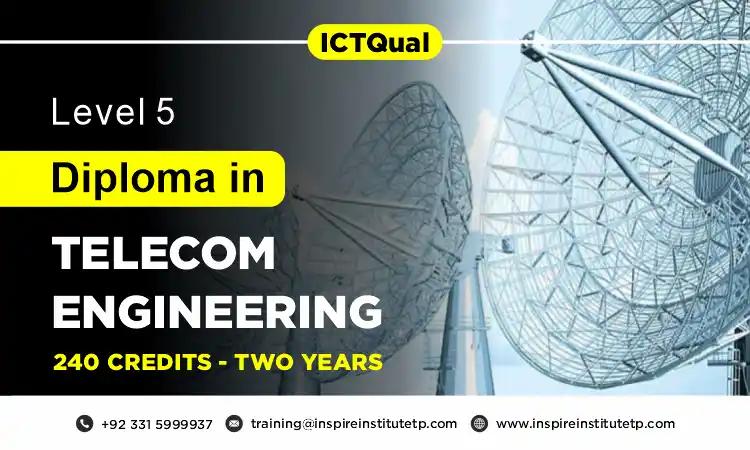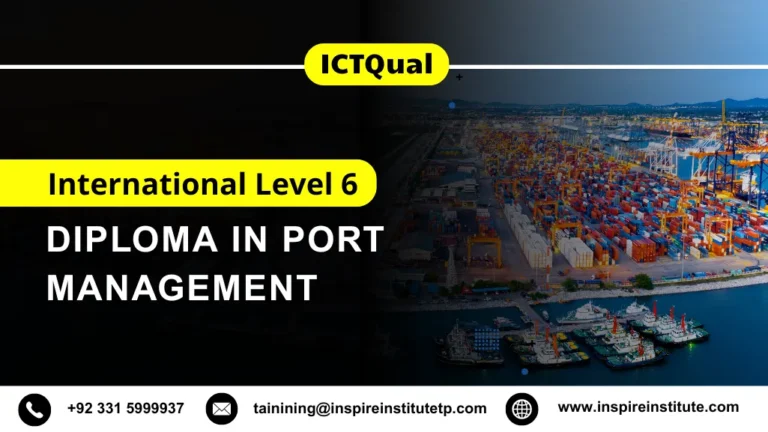ICTQual Level 5 Diploma in Telecom Engineering 240 Credits-Two Years
The ICTQual Level 5 Diploma in Telecom Engineering (240 Credits – Two Years) is a specialized qualification designed for individuals who want to pursue a career in the telecommunications industry. Over two years, this diploma provides in-depth knowledge and practical skills in telecom engineering, covering areas such as network design, installation, maintenance, and troubleshooting.
With a focus on both theoretical and hands-on learning, this qualification prepares learners for advanced roles in telecom engineering, equipping them with the expertise required to work with cutting-edge technologies and infrastructure in the fast-evolving telecom sector.
Why Choose this Qualification
Choosing the ICTQual Level 5 Diploma in Telecom Engineering offers numerous advantages for anyone looking to advance in the dynamic and ever-evolving telecom industry. Here are several key reasons why this qualification is an excellent choice:
1. Industry-Relevant Skills
The telecom industry is constantly advancing with new technologies, from 5G networks to fiber optics and cloud communications. This qualification equips you with up-to-date knowledge and practical skills in network design, installation, maintenance, and troubleshooting, ensuring you are well-prepared for the challenges of modern telecom engineering.
2. Comprehensive Curriculum
Spanning two years and 240 credits, the ICTQual Level 5 Diploma covers a broad range of topics, such as telecom network infrastructure, security, wireless technologies, and project management. The curriculum provides a solid foundation in both theoretical principles and hands-on experience, making you a well-rounded professional in telecom engineering.
3. Advanced Career Opportunities
By completing this diploma, you gain the expertise needed to take on senior or specialized roles in the telecom industry, such as network engineer, telecom technician, systems integrator, or project manager. The Level 5 qualification positions you for higher-level positions, offering a competitive edge in the job market.
4. Practical Learning Approach
This qualification places a strong emphasis on practical application, enabling you to gain real-world experience that can be directly applied in the workplace. You’ll learn how to design, implement, and manage telecom networks, working with the latest tools and technologies that are crucial to the industry.
5. Global Career Pathways
Telecom engineers are in high demand worldwide, and this qualification is recognized internationally, opening doors to global career opportunities. Whether you want to work in the UK, Europe, the Middle East, or further afield, the skills gained in this diploma are transferable across various telecom markets.
6. Pathway to Further Qualifications
The ICTQual Level 5 Diploma provides a strong foundation for further academic or professional development. After completion, you may choose to pursue higher-level qualifications, such as a Level 6 diploma or a related degree in telecom or ICT engineering, further enhancing your career prospects.
7. Support and Accreditation
This qualification is accredited by ICTQual, ensuring that it meets industry standards and is recognized by employers. You will also benefit from support throughout your studies, including access to resources, expert tutors, and a network of peers in the telecom industry.
Course Overview
Awarding Body:ICTQual AB
Course Level: Level 5
Average Completion Time:
2 year.
Credits Hours : 240
Evidence & Assignment Based
Qualification Structure
Year 1 (120 Credits)
- Introduction to Telecommunications Engineering
- Mathematics for Telecommunications
- Electrical Circuit Analysis
- Digital Logic and Systems
- Signals and Systems
- Principles of Communication Systems
- Data Communication and Networking Fundamentals
- Electronics for Telecommunications
- Antennas and Wave Propagation Basics
- Technical Drawing and CAD for Telecom Systems
- Health and Safety in Telecom Installations
- Professional Communication Skills
Year 2 (120 Credits)
- Advanced Communication Systems
- Wireless and Mobile Communication
- Optical Fiber Communication
- Microwave Engineering
- Internet of Things (IoT) in Telecommunications
- Network Design and Management
- Telecom Switching Systems and Networks
- Satellite Communication Systems
- Advanced Signal Processing
- Telecom Project Management
- Emerging Trends in 5G and Beyond
- Capstone Project in Telecommunications
Who Should Take This Course
The ICTQual Level 5 Diploma in Telecom Engineering is ideal for individuals who are passionate about technology and want to pursue a career in the rapidly growing telecommunications industry. This qualification is particularly suited to:
1. Aspiring Telecom Engineers
If you are looking to start or advance your career in telecom engineering, this diploma is a perfect fit. It provides the knowledge and skills required to design, implement, and maintain telecom systems and networks, preparing you for roles such as network engineer, telecom technician, or systems integrator.
2. Current Telecom Professionals Seeking Advancement
For those already working in the telecom industry, the ICTQual Level 5 Diploma is an excellent way to enhance your skills and qualifications. If you’re looking to move into more senior roles, such as telecom project manager or senior network engineer, this course will give you the technical expertise and leadership skills required to take on greater responsibilities.
3. ICT Professionals Looking to Specialize in Telecom
If you already have a background in ICT or information technology but want to specialize in telecommunications, this diploma is the perfect pathway. It will build on your existing knowledge and provide you with the specific skills needed to work in telecom engineering, including advanced network design, installation, and maintenance.
4. Graduates in Related Fields
Individuals who have recently graduated in related fields like electrical engineering, computer science, or network systems can benefit from this diploma. It offers an opportunity to specialize and gain practical experience in telecom engineering, opening doors to career opportunities in the sector.
5. Technicians and Engineers Transitioning into Telecom
If you’re currently working as a technician or engineer in a different technical field and are interested in transitioning to telecom engineering, this qualification will provide you with the necessary skills to make that career switch. The course covers essential telecom technologies, including network infrastructure, wireless communication, and telecom security.
6. Individuals Interested in Global Career Opportunities
Telecom engineers are in demand globally, and this qualification provides internationally recognized skills. If you are looking to work overseas or in global markets, this diploma will prepare you to work in telecom sectors worldwide, offering flexible career options across diverse regions.
7. Professionals Seeking Career Stability and Growth
Telecommunications is a critical and expanding industry, and the demand for skilled telecom engineers is set to increase as new technologies like 5G, IoT (Internet of Things), and cloud computing grow in importance. If you’re looking for long-term career stability and opportunities for growth, this qualification is a strong investment in your future.
The ICTQual Level 5 Diploma in Telecom Engineering is designed for anyone who is eager to advance their career in the telecom industry, whether you’re just starting out or looking to enhance your current qualifications. If you’re passionate about technology and want to develop the skills needed to work with cutting-edge telecom infrastructure, this course offers the perfect pathway.
Course Benefits
Course Benefits of the ICTQual Level 5 Diploma in Telecom Engineering
- Increased Earning Potential: Enhance your earning potential with advanced qualifications, opening doors to higher-paying roles in the telecom industry.
- In-Depth Knowledge of Telecom Engineering: Gain comprehensive understanding in key areas like network design, installation, maintenance, troubleshooting, and telecom security.
- Hands-On Experience: Develop practical skills working with the latest telecom technologies, preparing you to tackle real-world challenges in telecom engineering.
- Career Advancement Opportunities: Opens doors to senior technical roles such as network engineer, systems integrator, and telecom project manager, making you a competitive candidate in the job market.
- Specialized Expertise in Emerging Technologies: Learn about cutting-edge technologies like 5G, fiber optics, and IoT, ensuring you are prepared to work with the latest telecom infrastructure.
- International Recognition: The qualification is globally recognized, providing opportunities for telecom roles in regions like the UK, Europe, and the Middle East.
- Strong Foundation for Further Education: A solid base for pursuing higher-level qualifications (Level 6 or Level 7) or degrees in telecommunications or related fields.
- Industry-Relevant Curriculum: Learn current practices and technologies used in the telecom industry, allowing you to apply your skills immediately in the workplace.
- Personal and Professional Growth: Develop soft skills such as problem-solving, project management, communication, and teamwork, essential for leadership roles.
- Flexible Learning Options: Study full-time or part-time, with flexible learning pathways to suit your personal and professional commitments.
Eligibility Criteria
Eligibility Criteria for the ICTQual Level 5 Diploma in Telecom Engineering 240 Credits – Two Years course may vary depending on the institution offering the program. However, typical entry requirements for this course include:
A minimum of a Level 4 qualification (e.g., HNC, NVQ Level 4, or equivalent) in a related field such as telecommunications, electrical engineering, information technology, or a similar technical discipline. A solid foundation in network systems, communication technologies, and basic engineering principles is recommended, as the course builds on these skills and covers more advanced telecom engineering topics.
Minimum age of 18 years to enroll in the course.
Proficiency in English, as the program involves technical terminology, written assignments, and effective communication in the context of telecom engineering.
A strong understanding of mathematics, particularly in areas related to systems analysis, network management, and signal processing, as these subjects are fundamental for success in the course.
While not mandatory, prior experience in telecom systems, networking, or technical projects can be beneficial and enhance the overall learning experience in the course. This may include practical experience with network configuration, troubleshooting, or system implementation.
Qualification Route
Route for Candidates with No Experience
This route is ideal for learners who are new to the Telecom field and do not have prior work experience. The process is as follows:
- Admission: The candidate enrolls in the program at an ICTQual Approved Training Centre.
- Training: The learner undergoes formal training, covering all the essential study units. Training will include both theoretical instruction and practical activities.
- Assessment: Learners will be required to complete and submit assignments based on the course’s learning outcomes. These assignments will test the learner’s understanding and application of the course material.
- Certification: After successfully completing the required assignments and assessments, the learner will be awarded the ICTQual Level 5 Diploma in Telecom Engineering.
Route for Experienced and Competent Candidates
For candidates who already have relevant work experience in the Telecom industry, the following route is available:
- Eligibility: The candidate must have at least 2 years of verified experience in Telecom Engineering or a related field. This experience must be relevant to the learning outcomes of the qualification.
- Assessment of Competence: The candidate does not need to undergo the full training program. Instead, the ICTQual Approved Training Centre will assess whether the candidate’s existing knowledge and skills align with the learning outcomes of the course.
- Evidence Submission: The candidate must submit documentation and evidence of their work experience to demonstrate competence in the required areas. This can include job roles, responsibilities, and tasks performed that align with the learning outcomes of the course.
- Knowledge and Understanding: Centres must ensure that the candidate is familiar with all the course’s learning outcomes. If necessary, a skills gap assessment may be conducted to determine if any additional learning is required.
- Certification: Upon successful verification of experience and competence, the candidate will be awarded the ICTQual Level 5 Diploma in Telecom Engineering without having to complete the full training course.
Both routes ensure that candidates either gain the necessary knowledge through training or demonstrate their existing competency to achieve the ICTQual Level 5 Diploma in Telecom Engineering. This flexible approach caters to both new learners and experienced professionals seeking formal certification.







